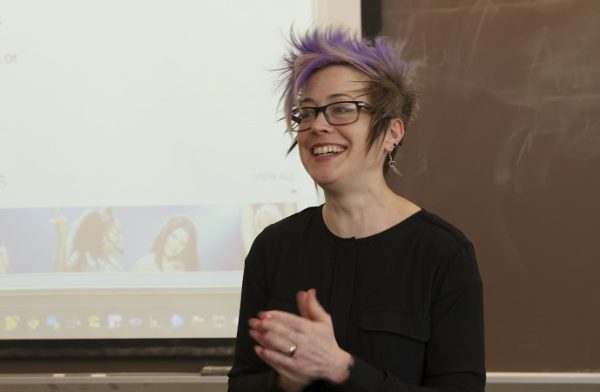Robin James Honored as Teaching, Research Award Finalist

Robin James of the Department of Philosophy is one of three nominees for the College’s Integration of Undergraduate Teaching and Research Award. The other two nominees are Paula Connolly of English and Joe Kuhns of Criminal Justice and Criminology.
James is an associate professor of Philosophy at UNC Charlotte. She is the author of two books: Resilience & Melancholy: pop music, feminism, and neoliberalism which was published by Zero books in February 2015, and The Conjectural Body: gender, race and the philosophy of music was published by Lexington Books in 2010.
Her work on feminism, race, contemporary continental philosophy, pop music, and sound studies has appeared in The New Inquiry, Noisey, SoundingOut!, Hypatia, differences, Contemporary Aesthetics, and the Journal of Popular Music Studies. She is also a digital sound artist and musician, and often works as a member of citation:obsolete. She blogs at its-her-factory.com and is a regular contributor to Cyborgology and xcphilosophy.
For James, the integration of teaching and research means using classroom conversations as a place to begin and continue her own research practice and teaching students some of the practices, including blogging, public writing, creative research in sound and the process of writing a book. “Often the questions I bring to class are ones I’m still working on, to which I don’t yet have answers,” James said. “The classroom is a place where the students and I work through philosophical questions, concepts, and problems together.”
James has developed a new team-taught course for spring 2016, supported by a SOTL grant, that will give students the opportunity to engage philosophy via new media including film, video, websites and social media. They will interview Charlotte people on topics that connect philosophy to their lives. This will continue her practice of giving students hands-on experience developing philosophical ideas in ways that model what scholars do.
Students commend James for being, as one student describes it, “a valuable living resource.” This student commented, “She encourages us, and in doing so helps us to realize the potential works that lie within us. But what distinguishes her from other professors I have is not just her ability to understand her students, but her affinity for understanding her students.”